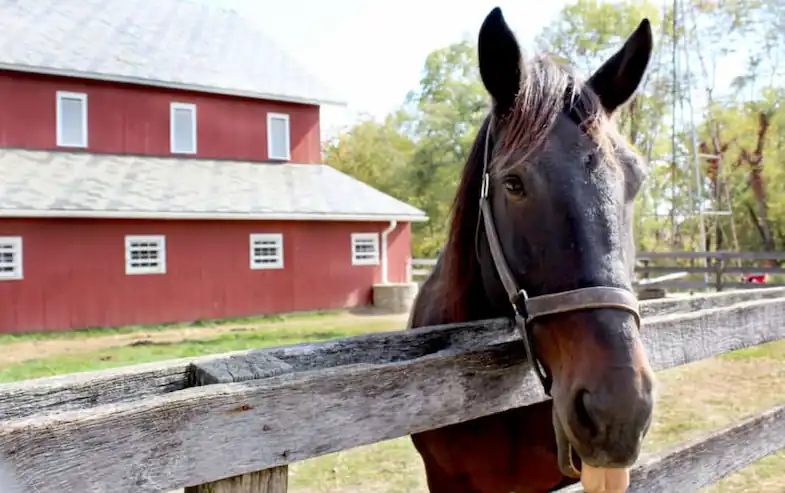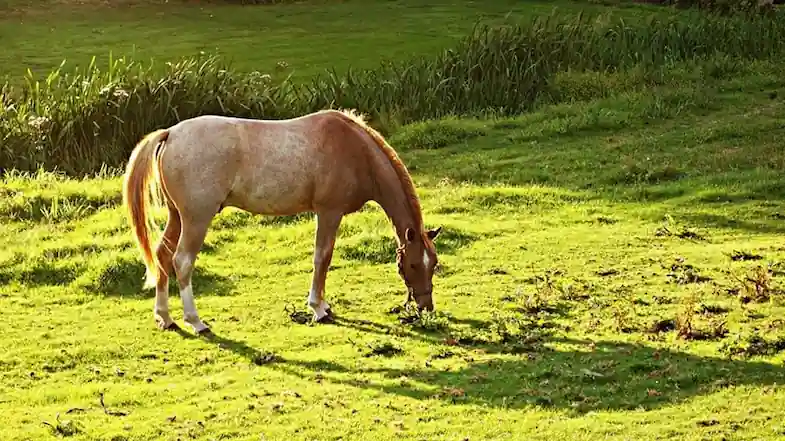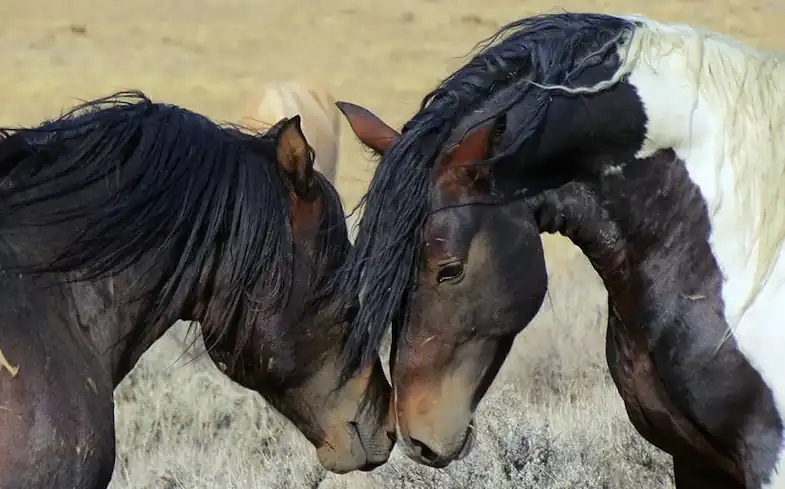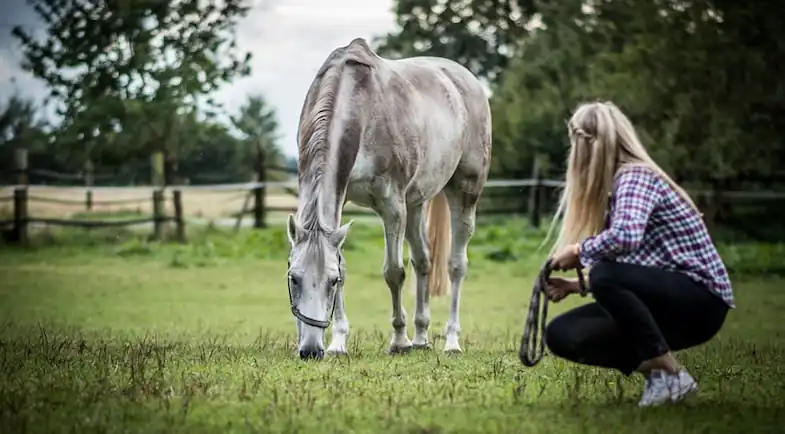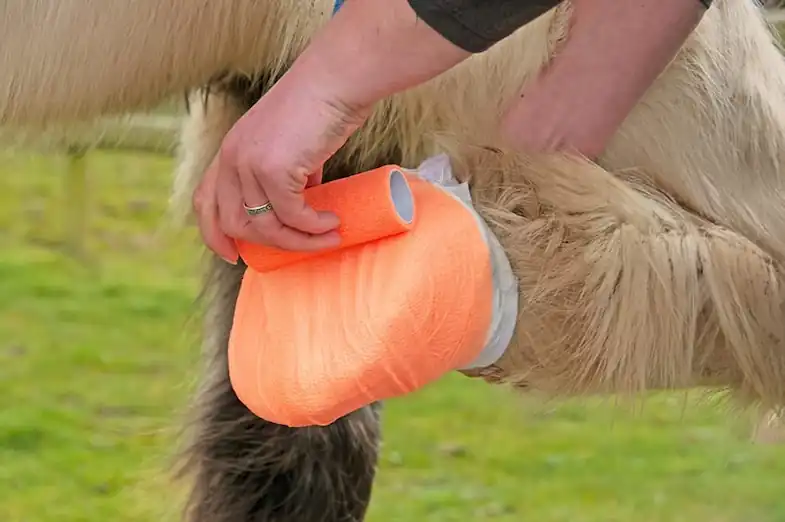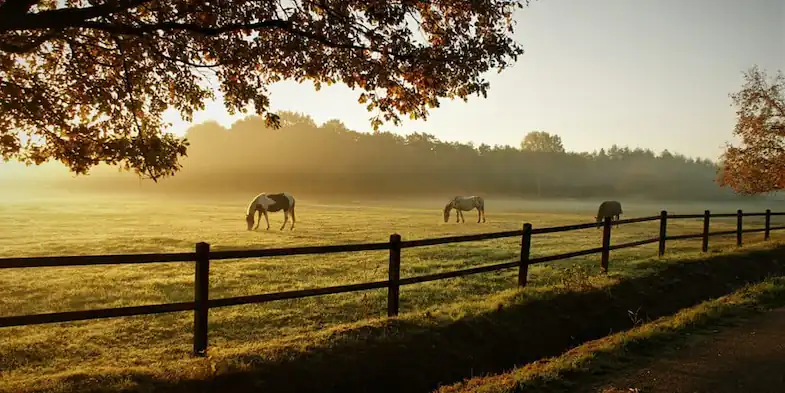Over the years I’ve spoken to many new horse owners (as well as some experienced ones) that have decided to take the plunge and adapt their backyard so that they can keep their horse there. And while for most this has been a good thing there are a few who regretted it pretty quickly, saying they didn’t realize exactly what was involved. While hindsight is a wonderful thing it can be an expensive and stressful (especially for your horse) lesson to learn which is why I decide to write this article.
Keeping a horse in your backyard isn’t for the faint-hearted, it’s not necessarily cheaper than a boarding yard and involves a lot of hard work. That said it’s not without its benefits, you can see your horse whenever you want and you have peace of mind knowing that he’s safe.
What you need to consider before bringing your horse home
Keeping a horse (or horses) at home is the dream of many owners but in order to make that dream reality, it’s vital that you do your homework first and make sure that you have the funds as well as the time to give your horse everything he needs.
Do you have the budget to keep your horse at home?
Many people think that keeping a horse at home will be far cheaper than keeping them at a boarding yard but this isn’t necessarily the case. Boarding yards often buy things such as feed, bedding, and hay in bulk but if you’re caring for your horse at home you probably won’t have the space (or the budget) to do this which will push the price of these supplies up.
As well as regularly buying food, hay, bedding, and supplements your horse will also need regular veterinary and farrier checkups as well as having their teeth checked. Then there are the unexpected costs if your horse falls ill or injures himself.
You’ll need to budget for all of these things (as well as for insurance) as well as making sure you have enough leftover in case of emergencies, how much you keep for this is up to you but personally, I like to have around $100 per month. The table below gives you a rough idea of how much a horse can cost per month.
| Weekly | Monthly | Annually | |
| Feed | $27 – $70 | $120 – $300 | $1440 – $3600 |
| Hay | $25 – $54 | $110 – $230 | $1320 – $2790 |
| Bedding | $37 – $118 | $160 – $510 | $1920 – $6120 |
| Water | $4.50 – $8 | $20 – $34 | $240 – $408 |
| Supplements | $16 – $30 | $70 – $130 | $840 – $1560 |
| Veterinarian | $1 – $3 | $5 – $15 | $60 – $180 |
| Farrier | $5 – $19 | $22 – $80 | $270 – $970 |
| Dentist | $1 – $2 | $5 – $10 | $60 – $120 |
| Worming | $0.90 – $2.50 | $4 – $11 | $50 – $130 |
| Insurance | $1 – $0.45 | $5 – $25 | $60 – $300 |
| Miscellaneous | $23 | $100 | $1200 |
| Total | $141.40 – $329.95 | $621 – $1445 | $7460 – $17,378 |
Of course, all of the figures above are a guide to how much the ‘average’ horse costs, and there will always be things you can do to reduce the amount of money you spend on your horse.
Is there enough space for your horse?
The amount of space that a horse needs is often overlooked in the excitement of bringing your horse home to live with you, yet it’s so important for his welfare. He needs to have enough space to be able to stretch his legs (and let’s be honest they’re pretty long legs) if he wants to, there should be enough grazing to meet his daily needs (approximately 2% of his body weight) as well as enough ’spare’ grazing so you can maintain a proper pasture management plan. There should also be enough land so that your horse can escape (or hide) from his field mates if he wants a bit of quality time to himself.
The amount of land a horse needs will depend on a number of factors such as whether they’re stabled overnight or have 24 hour access to grazing as well as how much exercise they get. As a very general rule, a horse needs between 1.5 to 2 acres with this increasing by an acre for every other horse you have.
Making sure your horse can’t escape
Even if your land is surrounded by natural fencing such as hedges you should still consider using some sort of fence. It’ll have a two-fold advantage of keeping your horse safely in the field, while also helping to deter any possible theft.
The fencing you choose will be dependent on your budget, how much time you have to maintain it, the landscape as well as whereabouts you live. I recently wrote an article looking at different fencing options that will help you to choose the right option for you.
Does your horse have a shelter?
The jury is still out on whether it’s okay to keep a horse outside all year round or if you should shelter them at night, but regardless of what you choose to do (or which side of the fence you’re on), you’ll still need to provide some sort of field shelter for your horse.
The ideal shelter will be closed on three sides and offer your horse a warm, dry place to seek refuge from the elements. It should also have a covered roof so that your horse can hide away from the blazing sun during the summer.
If you have a few horses then your shelter should be big enough to allow all of the horses to use it at the same time, unless of course, you have the space for multiple shelters.
Is your horse going to be lonely?
Horses are herd animals that can suffer a lot of stress if they’re forced to live on their own which obviously isn’t a problem if your horse is kept at a boarding yard but if your horse lives in your backyard it can sometimes be a different matter.
If money was no object then of course you’d have a whole herd of friends for your horse to play with but sadly money is often a problem for many of us. That doesn’t mean to say though that your horse should forgo company and companionship. Other animals, while not necessarily being perfect, can make a good alternative to another horse, animals such as alpacas, sheep, and even chickens make good companions.
If your budget really won’t stretch to a field mate for your horse then don’t worry there are things you can do to stop your horse from feeling lonely, things such as keeping him occupied with toys or playing music will help.
Where are you going to ride?
It’s so easy to get caught up in the excitement of bringing your horse to live in your backyard that you can often overlook the riding aspect but it’s something you need to take into account. You need to think about where you’re going to ride, do you have enough land yourself or do you live close to public land (or have the owners permission to ride on their land).
Instead of riding at home (or close to home), some people choose to meet up with friends and ride together with them. This can be great for you but also for your horse, especially if he doesn’t have the company of other horses.
Do you have the space to store supplies?
It’s advisable to make sure you have a least one week’s supply of food and bedding for your horse but you’ll also need to store this somewhere, ideally away from your horse and your home.
You should keep food securely locked away so that your horse can’t help himself when he feels a little peckish. If possible you should also keep the food in plastic or metal bins that are sealable, this will help to keep the food fresh but will make it harder for mice or other rodents to get in.
Bedding (especially straw) and hay should be kept under a cover (or roof) to protect it from the rain. It should also be kept well away from your horse and any wooden buildings. If possible you should also keep a fire extinguisher (or two) close by, this will help you to reduce the spread of any fire if the worst happens.
Caring for a backyard horse
Now that your backyard is ready for your horse it’s time to bring him home but are you really ready to look after him? Keeping your horse at a boarding yard is totally different to keeping him at home and, while you may be doing some of the work if you stable him away from home, you’ll have to do EVERYTHING when he’s living with you. That may sound like a daunting prospect but if you’re prepared and understand what your role is it’ll be a lot easier (although it’ll still be hard work).
Understanding your horse
I don’t just mean understanding your horse’s personality and quirky behavior, I mean really understand everything about him. From what his normal heart rate is to how quickly (or slowly) he eats his food as well as where his favorite rolling patch is and what frightens him. I know this might sound a bit obsessive, and to some extent it is, but only by fully understanding everything about your horse will you be able to notice when something is wrong.
Pasture management plan
Regardless of whether you’re keeping your horse at pasture or stabling him, you’ll still need to make sure he has access to good quality grazing and part of this means that you’ll need to have a good pasture management plan. This means you’ll need to plan ahead, understand about soil quality, when to mow the grass for the best plant growth and weed control as well as how to identify a variety of toxic plants.
If you only have a small amount of land then you’ll need to have rotate your horse’s grazing. This means that you can maximize the quality of the grazing while reducing the amount of hay your horse needs (and therefore keeping some of your costs down). Pasture rotation simply means that you divide the area into at least three sections, your horse will then graze one section for around four or five weeks before moving to a different section that has had time to re-grow.
Pasture rotation simply means that you divide the area into three sections and rotate your horse in a circular fashion every four to five weeks. This works on a graze and rest system that allows the grass to recover from grazing, doing this increases the growth (and health) of the grass by around 20%.
Learning basic medical skills
While you should always speak to your veterinarian if you’re not sure about anything there are some things that you can do yourself. Learning how to clean and dress wounds, administer medication and check your horse’s vital signs will help to save you a great deal of money in the long run.
If you want to learn some basic medical skills you can enroll in an online course, subscribe to a video learning service, or speak to fellow horse owners for advice. Your veterinarian may even be willing to help advise you on some of the things you can do at home.
Do you have the right tools?
You might think that you need to stock up with every type of tool your local farm store sells but, while many of them may be useful, there will also be plenty that you just don’t need and will probably never use (as well as some that you will but hadn’t thought about). If you start with the basics such as a broom, barrow, and fork the rest you can buy as and when you need them.
Over time you’ll also pick up tips and tricks for different tools and even household utensils that are must have’s. For example, a spider strainer is perfect for scooping leaves out of the water trough.
Disposing of your horse’s waste (manure)
Every positive has a negative and manure certainly is the downside to owning a horse but it’s something that you’ll have to think about, unfortunately, even if your horse is kept at grass. Removing the manure (whether from the field or while mucking out) is an essential part of horse ownership but it’s only half of the task. As well as removing it you’ll also have to think about storing it and arrange its disposal.
If you live close to other people you’ll have to also consider your neighbors when thinking about what to do with the manure (and the inevitable smell). Some waste removal companies will supply you with a dumpster to put the waste in, they’ll then collect it generally every week. This can be a good idea but, depending on the weight, can also become quite expensive.
Another option is to bag it up and give it away to people for free, this involves more work but can often be a very good way to get rid of the pongy stuff!
Make sure you have an emergency fire procedure
We all want to think that a fire will never happen to us if we’re careful and sensible but it never hurts to be prepared, just in case. After all, you may do everything you can to minimize the risk but there’s always the chance of a stray firework starting a fire or even the sun triggering a fire if the summer has been particularly dry.
Make sure you have plenty of fire buckets (filled with sand) and fire extinguishers around the yard and that you check them regularly. It’s also important to have a plan in place for getting your horse (or horses) out if there is a fire.
If you don’t have a proper fire procedure in place then speak to your local fire department for advice about what you should do.
What are the advantages of keeping a horse at home?
Most people who keep their horse at home will tell you that being able to see them any time they want to is the biggest advantage, something I certainly find difficult to argue with and I’m sure many owners will agree. Nothing beats waking up and having your morning coffee with your horses.
What are the disadvantages of keeping a horse at home?
Keeping a horse in your backyard isn’t always a bed of roses and you’ll have to do everything yourself which can put a strain on your relationships (especially if your partner isn’t a horsey person), it’ll also impact on your social life as well as your bank balance. You’ll also miss out on the support network that you’d get if your horse was boarding somewhere else.
Is keeping a horse in your backyard a good idea?
When I was young I always dreamt of waking up in the morning, looking out of the window, and seeing my horse grazing in the backyard and despite the hard work involved, I have to say I would do it again without hesitation. Yes, it’s hard work and you have to give up a lot (friends, vacations, spending money, the list goes on) but the joy is seeing your horse happily frolicking in the field makes all of that hard work worth it.
Of course, everybody is different and while it works for many people it won’t work for everybody so if you don’t think keeping a horse in your backyard is for you don’t feel bad (and don’t let anybody else make you feel bad either). The most important thing is your horse’s happiness and welfare and if that means he’s better off at a boarding yard then don’t move him.
Further reading
- How much water do horses need?
- Why do horses paw the ground?
- How horses find their own way home
- Relieving your horse’s stall rest
- The real cost of horse ownership
- How to find the best horse for you
- Tips to successfully load a difficult horse
- The coolest barns money can buy
- Protect your horse against theft
- What your first aid kit should contain
I hope you found this article helpful. If you did I’d be grateful if you could share it please as it would really help me.
Recommended products
Over the years I have tried hundreds of different horsey products, from various blankets and halters to different treats. Some I’ve loved, others I’ve hated but I thought I’d share with you my top all-time favorite products, the ones I never leave the yard without. I’ve included links to the products (which are in no particular order) that I really think are great.
- Horse Knots by Reference Ready – If you’re like me and enjoy pocket reference guides then you’ll love this knot tying guide. These handy cards can easily fit in your pocket or attach to the saddle for quick reference. They’re waterproof, durable and are color coded to make them easy to follow.
- Mane ’n Tail Detangler – Even if you never show your horse you’ll need to detangle his tail from time to time (and possibly his mane too) which is always a challenging chore! I’ve found that if I run a little bit of detangler through my horse’s tails every few days it stops them from getting matted up and makes combing them easy, even if they’re coated in mud. I don’t know if I should admit to this or not but it also works wonders on my hair.
- TAKEKIT Pro clippers – Over the years I’ve tried a lot of different clippers and while some were obviously better than others I found these to be by far the best. They are heavier than a lot of other clippers but for me, that’s a good thing, it makes them feel more sturdy and hardwearing. On top of that they have a range of speeds so are just as good for clipping your horse’s back as they are his face. I also like the fact that they come in a handy carry case but that’s not for everybody. The company that makes them is super good and incredibly helpful too, a real bonus these days. The only thing I wasn’t keen on was the fact that it doesn’t come with any oil, but that’s not a major problem as it’s not difficult to buy lubricant.
- Shire’s ball feeder – There are so many boredom buster toys out there but I like to use these every day, regardless of whether or not my horses are bored. I find that it helps to encourage my horses to problem solve by rewarding them with treats (or pieces of fruit) but it also mimics their natural grazing behavior which helps to keep them calm and de-stressed.
- Horse safe mirror – This is a strange one that many people are surprised about but I like to put horse safe mirrors in the trailers as well as in the quarantine stalls. It helps to prevent the feeling of isolation by giving the impression of other horses being around. Being herd animals horses can get extremely stressed when they feel that they’re on their own but with these stick-on mirrors, they believe that at least one other horse is with them.
- Rectal thermometer – I know this isn’t glamourous at all but it’s vital for your horse’s well-being to be able to check their temperature and a rectal thermometer is the easiest way of doing this which is why I’ve added it to the list.
Shopping lists
I’ve also put together a few shopping lists of essential items that I’ve found helpful over the years. I’ve broken the lists down into different categories rather than put everything in one massive list 😉

